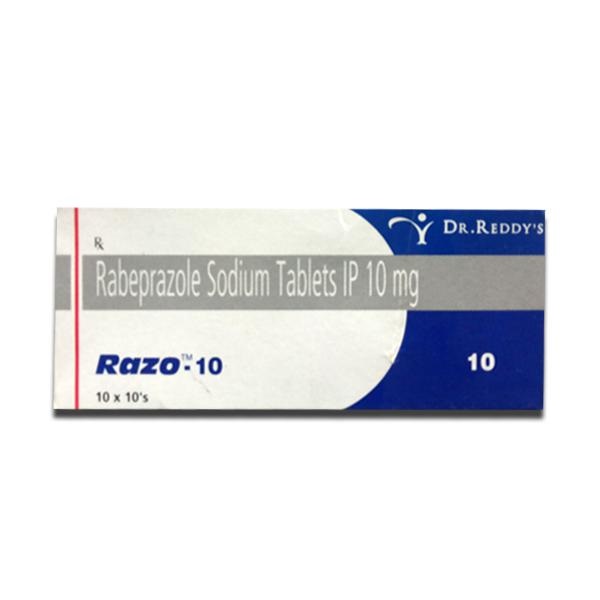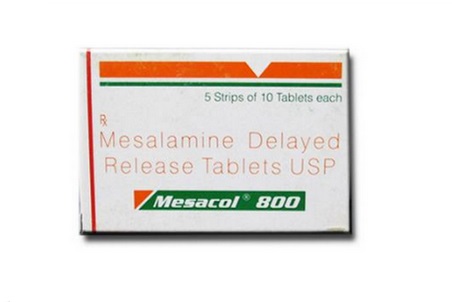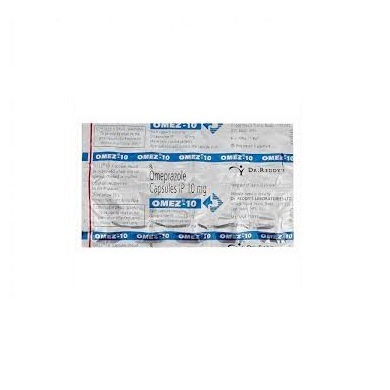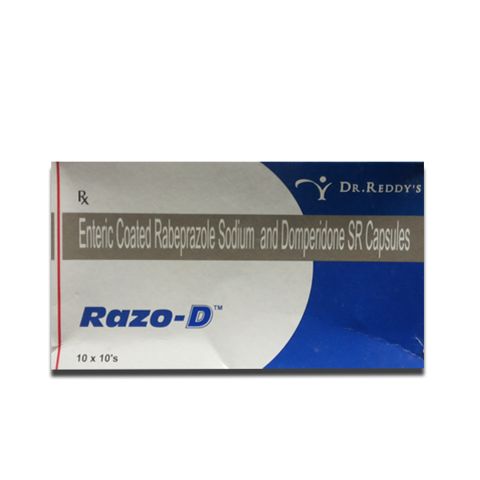Razo 10mg
Acid reflux, indigestion, and heartburn can significantly impact our daily lives. Enter Razo 10mg, a medication designed to alleviate these discomforts. It falls under the category of proton pump inhibitors (PPIs), which work by reducing stomach acid. This ultimately brings relief from the burning sensations and pain associated with acidic issues. Razo is the Brand Name for Rabeprazole.
The Power of Rabeprazole 10mg
At the heart of Razo, 10mg lies rabeprazole, its active ingredient. Rabeprazole is known for its potent acid-suppressing abilities, making it a popular choice for managing gastroesophageal reflux disease (GERD) and other acid-related disorders.
Unveiling Rabeprazole Capsules 10mg
Razo 10mg is conveniently available in capsule form. These capsules ensure the controlled release of the medication, allowing it to reach its target gradually and provide sustained relief over time.
Investigating Rabeprazole 10mg Price: A Deal at $7.50
Affordability is often a concern when it comes to healthcare. The good news is that you can get your hands on Razo 10mg at an attractive price of $7.50 per capsule from v--Care Pharmacy. This means relief from discomfort doesn't have to break the bank.
Understanding Rabeprazole Price
The cost of healthcare is a critical consideration for many. The price of rabeprazole can vary, but with Razo 10mg, you're not only getting an effective solution but also a cost-friendly one.
Mastering Rabeprazole Pronunciation
Pronouncing medication names can be a tongue-twisting challenge. Fear not, as mastering "rabeprazole" is simpler than it seems. Break it down into syllables: ra-be-pra-zole, and you're good to go!
Counting the Cost: Is Rabeprazole Affordable?
Healthcare expenses can add up quickly, but Razo 10mg offers relief not only for your symptoms but also for your wallet. Affordable and effective, it's a win-win situation.
The Dosage Dilemma: Rabeprazole 10mg Twice Daily
Dosage plays a pivotal role in medication efficacy. For most individuals, a dose of Razo 10mg twice daily is recommended. However, it's essential to follow your healthcare provider's guidance for the best results.
Rabeprazole vs. Omeprazole: Battle of the Proton Pump Inhibitors
In the world of PPIs, both rabeprazole and omeprazole hold their ground. While they share similarities, their differences set them apart. Consulting your doctor can help determine which one suits your needs better.
Rabeprazole and Omeprazole are both proton pump inhibitors (PPIs) that are commonly used to treat conditions related to excessive stomach acid production. While they belong to the same class of medications and work in a similar way, there are some differences between them. Here's a comparison of Rabeprazole vs. Omeprazole:
Mechanism of Action:
- Both Rabeprazole and Omeprazole work by inhibiting the proton pump in the stomach lining, which reduces the production of stomach acid. This helps in managing conditions like GERD, ulcers, and other acid-related disorders.
Onset of Action:
- Rabeprazole is often considered to have a more rapid onset of action compared to Omeprazole. This means that it may start reducing stomach acid production more quickly after administration.
Duration of Action:
- Omeprazole has a relatively longer duration of action, meaning it stays effective in reducing acid secretion for a longer period compared to Rabeprazole.
Dosage Frequency:
- Due to its longer duration of action, Omeprazole is often taken once daily, whereas Rabeprazole might need to be taken twice daily for optimal acid suppression.
Interactions with Other Drugs:
- Both medications can interact with certain drugs and substances. It's important to discuss your full medication list with a healthcare professional before starting either Rabeprazole or Omeprazole.
Efficacy and Effectiveness:
- The efficacy of Rabeprazole and Omeprazole is generally considered to be quite similar in terms of acid suppression and managing acid-related conditions. However, individual responses to medications can vary, so a healthcare provider might recommend one over the other based on a patient's specific needs.
Side Effects:
- Both medications can have similar side effects, which might include headache, nausea, abdominal pain, and diarrhea. Serious side effects are rare but can include an increased risk of bone fractures, kidney issues, and Clostridium difficile infection.
- It's important to note that the choice between Rabeprazole and Omeprazole depends on factors such as the specific condition being treated, individual patient response, potential drug interactions, and overall medical history. Your healthcare provider will be the best person to guide you in choosing the most appropriate medication for your situation.
- As always, before starting, stopping, or changing any medication, it's essential to consult a healthcare professional to ensure that the chosen treatment is safe and suitable for your specific medical needs.
Side Effects of Razo 10mg:
Razo 10mg (Rabeprazole) is a medication used to treat certain stomach and esophagus problems such as acid reflux and ulcers. While it is generally well-tolerated, like any medication, it can have side effects. Common side effects may include:
- Headache: Some individuals experience mild to moderate headaches.
- Nausea: Nausea or a feeling of queasiness might occur, especially when starting the medication.
- Diarrhea or Constipation: Changes in bowel habits, including diarrhea or constipation, could be observed.
- Stomach Pain: Some people might experience abdominal discomfort or pain.
- Flatulence: Increased gas or flatulence could occur.
- Vomiting: In some cases, individuals might experience vomiting.
- Dizziness: A sensation of dizziness might be felt, although this is less common.
- Fatigue: Some individuals could experience a sense of tiredness or fatigue.
- Rash or Itching: Skin reactions such as rash or itching might occur in rare cases.
- Muscle or Joint Pain: Muscle or joint pain could be experienced by a small number of individuals.
- Changes in Blood Tests: There might be slight changes in certain blood tests, such as liver function tests.
- Increased Risk of Bone Fractures: Prolonged use of certain acid-suppressing medications, including Razo, may slightly increase the risk of bone fractures.
It's important to note that not everyone will experience these side effects, and some individuals may experience not at all. If you notice any unusual or severe side effects while taking Razo 10mg, it's recommended to contact your healthcare provider for advice. Additionally, if you have any pre-existing medical conditions or are taking other medications, it's essential to discuss potential interactions and side effects with your doctor before starting Razo 10mg.
Getting Acquainted with the Generic Name of Razo 10mg
"Rabeprazole" is the generic name behind Razo 10mg. This is the non-proprietary name used to identify the medication's active ingredient. Knowing the generic name can help you make informed decisions about healthcare.
Uses of Razo 10mg
Razo 10mg is a brand name for the medication Rabeprazole, which belongs to a class of drugs called proton pump inhibitors (PPIs). It is primarily used to treat conditions related to excess stomach acid production. Here are some common uses of Razo 10mg:
- Gastroesophageal Reflux Disease (GERD): Razo 10mg is often prescribed to manage GERD, a condition where stomach acid flows back into the esophagus, causing heartburn, regurgitation, and discomfort.
- Peptic Ulcers: It can help heal and prevent peptic ulcers, which are open sores that develop on the lining of the stomach, small intestine, or esophagus due to excessive acid production and infection with Helicobacter pylori bacteria.
- Erosive Esophagitis: Razo 10mg can be used to treat erosive esophagitis, a condition where the lining of the esophagus becomes inflamed and damaged due to stomach acid backing up into it.
- Zollinger-Ellison Syndrome: This is a rare condition where the stomach produces more acids. Razo 10mg can help control excessive acid production in individuals with this syndrome.
- Prevention of NSAID-Induced Ulcers: Nonsteroidal anti-inflammatory drugs (NSAIDs) can sometimes cause irritation and ulcers in the stomach and small intestine. Razo 10mg may be prescribed to prevent these ulcers in people who need to take NSAIDs regularly.
- Helicobacter Pylori Eradication: Razo 10mg is sometimes used as part of a combination therapy to help eradicate Helicobacter pylori bacteria, which can contribute to peptic ulcers and stomach inflammation.
It's important to note that the information provided here is for general knowledge and informational purposes. You should always consult a qualified healthcare professional before starting or discontinuing any medication, including Razo 10mg, to ensure that it's appropriate for your specific medical condition and needs.
FAQs About Razo 10mg
Q1: What is Razo 10mg?
Razo 10mg is a medication that contains the active ingredient Rabeprazole, which belongs to the proton pump inhibitor (PPI) class. It's commonly used to treat conditions like gastroesophageal reflux disease (GERD), ulcers, and excessive stomach acid production.
Q2: How does Razo 10mg work?
Razo 10mg works by inhibiting the action of proton pumps in the stomach lining. This reduces the production of stomach acid, providing relief from acid-related conditions such as heartburn and acid reflux.
Q3: What conditions does Razo 10mg treat?
Razo 10mg is primarily used to treat GERD (gastroesophageal reflux disease) and associated symptoms like heartburn. It's also prescribed for healing and preventing ulcers in the stomach and the upper part of the small intestine.
Q4: How should I take Razo 10mg?
Take Razo 10mg exactly as prescribed by your healthcare provider. It's typically taken once daily before a meal. Swallow the tablet whole with water, without crushing or chewing it.
Q5: Are there any side effects of Razo 10mg?
Yes, like any medication, Razo 10mg can have side effects. Common side effects include headache, nausea, diarrhea, and abdominal pain. If you experience severe side effects like allergic reactions or changes in urine color, seek medical attention.
Q6: Can I take other medications while on Razo 10mg?
It's important to inform your healthcare provider about all medications you're taking, including over-the-counter drugs and supplements. Some medications, like certain antifungal agents and anticoagulants, might interact with Razo 10mg.
Q7: How long does it take for Razo 10mg to start working?
The onset of relief varies from person to person. Some individuals might experience symptom relief within a few days, while others might take a couple of weeks to notice significant improvement.
Q8: Is Razo 10mg safe during pregnancy?
Consult your doctor before taking Razo 10mg if you're pregnant, planning to become pregnant, or breastfeeding. While it's generally considered safe, your healthcare provider will assess the benefits and potential risks for your specific situation.
Q9: Can Razo 10mg be given to children?
Razo 10mg is typically not recommended for use in children. However, if a doctor deems it necessary, they will prescribe an appropriate dosage based on the child's age, weight, and medical condition.
Q10: Can I drink alcohol while taking Razo 10mg?
Alcohol can increase stomach acid production and potentially counteract the effects of Razo 10mg. It's advisable to limit alcohol consumption while using this medication to ensure its effectiveness. Always consult your healthcare provider for personalized advice.
Q11: Is Razo 10mg effective for all types of acid-related issues?
Razo 10mg is primarily designed to address acid reflux, indigestion, and heartburn. If you have specific concerns, consult your doctor for personalized advice.
Q12: Can I purchase Razo 10mg without a prescription?
No, Razo 10mg is a prescription medication. Always consult professional healthcare before starting any new medication.
Q13: Are there any side effects associated with Razo 10mg?
Like all medications, Razo 10mg may have side effects. Common ones include headaches and stomach pain. Consult your doctor if you experience any adverse reactions.
Q14: How long does it take for Razo 10mg to provide relief?
The onset of relief can vary from one person to another. However, many people experience improvement within a few days of starting Razo 10mg. Patience is key.
Q15: Can you take rabeprazole at night?
Yes, you can take rabeprazole at night. Rabeprazole is a medication used to treat conditions like gastroesophageal reflux disease (GERD) and stomach ulcers. Taking it at night can be effective since it helps control nighttime symptoms like acid reflux. However, it's essential to follow your doctor's instructions for the correct dosage and timing. Always consult your professional healthcare provider before making any changes to your medication routine.
Conclusion
In the realm of acid-related discomfort, Razo 10mg emerges as a reliable companion. With its potent rabeprazole formula, affordable price, and user-friendly dosage, it's a go-to choice for those seeking relief. Don't let heartburn hold you back—access relief with Razo 10mg.
Your review is submitted successfully. It will be live after approval, and it takes up to 24 hrs.






